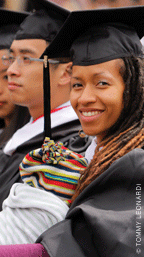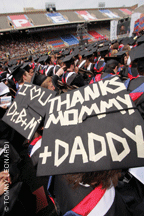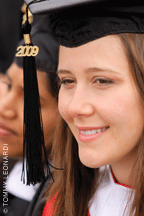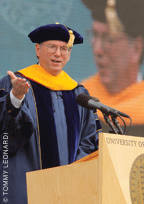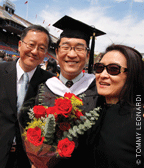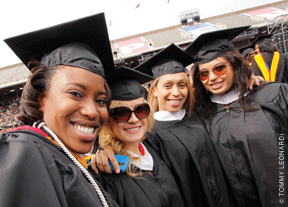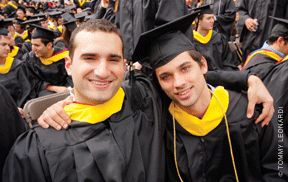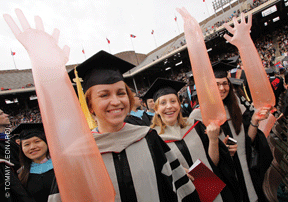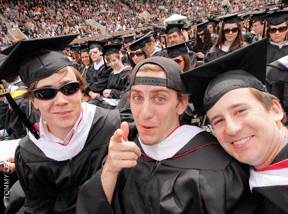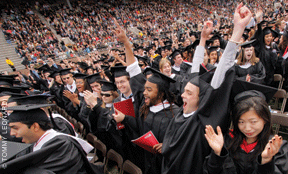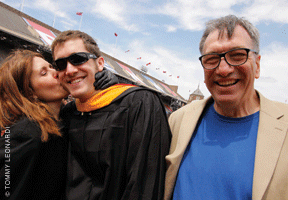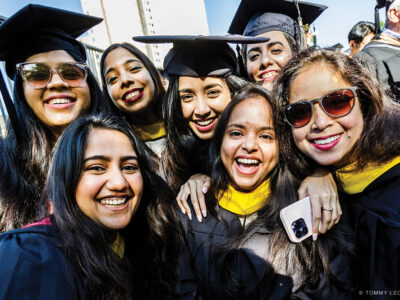The generations mingled at the University’s 253rd commencement on May 18. Jay Furman ME’34 was on hand, in town to celebrate his 75th reunion. But this year’s ceremony also had a distinctly technological flavor. Google CEO Eric Schmidt was the guest speaker, a live webcast was available online, and the ceremony was accompanied for the first time by a Twitter feed, allowing students to chime in as the day unfolded.
The graduating class wasn’t shy. Seconds after Schmidt reminded them that technology wasn’t everything, BlackBerries were rustling among the caps and gowns. “Google CEO says, ‘Turn off your computer and cell phone.’ Uh, later :-)” came one of the covert responses.
But the PennCommence Twitter feed offered more than just witty rejoinders in real time. It provided a student’s-eye view of the day, documenting early morning nerves, cellphone snapshots of the joyful procession unspooling down Locust Walk, Law grads belting out “Ole! Ole! Ole!,” and occasions to simply bask in the bittersweet end: “THE BIG DAY IS HERE!”
The temperature was also a common theme. It was a crisp, overcast morning that slowly brightened until hints of sun finally snuck through the clouds, lighting the tops of caps and tasse ls arrayed across the field as Penn President Amy Gutmann began to speak.
“What matters most?” she asked the Class of 2009. With economic bubbles bursting around them and jobs in short supply, she said, this question takes on a sharp new meaning.
She quoted Ludwig Wittgenstein, who called genius “talent exercised with courage,” and urged the graduates to pursue what matters most to them in this same spirit, whatever direction it might take them. “I don’t see any of you,” she said, “none of you, following a single straight and narrow path to maximum security.” That sort of security, she added, “has a ring of prison about it.”
The task of introducing Google’s chief executive fell to interim provost Vincent Price, who would be named to that post on a more permanent basis a few weeks later [see next story]. Price explained that to prepare his remarks, he wanted to know more about Schmidt. So “I did what any sensibly hip person would do,” he said. “I went to the Internet, and I Yahooed him.” After the laughter subsided, his point had made itself. “Your reaction says much about what Eric Schmidt has accomplished.”
Schmidt opened by acknowledging the debt that the computer industry as a whole owes to Penn, where the ENIAC was created in 1946, which he credited as the precursor to “every computer, every mobile phone, and every device” around us. A hearty cheer went up from the Engineering section.
The vast distance technology has traveled since then was a theme he’d return to. “We used mainframe computers with 300 megabytes of storage to go to the moon six times. You use iPods with 120 gigabytes—that’s about 500 times more—to get to your next class,” he said.
This set the stage for a forecast of the near future, when, Schmidt imagined, we’ll be able to ask Google to locate our car keys, or buy an iPod that will hold about 85 years’ worth of video—essentially the span of a human life.
Yet Schmidt stressed that technology wasn’t just about gadgets, but the power to bring people together. The days of solitary figures toiling in a lonely lab are over, he said. And thinking in groups is “much more fun, anyway.” Regardless of whether we’re online or in a traditional university setting, he noted, “None of us is as smart as all of us.”
Quoting George Bernard Shaw’s advice that “all progress depends on the unreasonable man,” Schmidt suggested that graduation itself can provide the courage to be unreasonable.
“Don’t bother to have a plan,” he declared. “Instead, let’s have some luck.” Life won’t reward those who simply avoid mistakes, he went on, but rather those who learn best from them. And while moments of inspiration or innovation are never neatly planned, he urged the class to be ready to meet them. “When you see it, you can jump on it,” he said, “and you can make a difference.”
So “think of something completely new,” he said, “and go work on that.” Above all, he cautioned against letting fearfulness discourage the Class of 2009 from exploring their most original ideas. “A mind set in its ways is a life wasted,” he said. “Don’t do it.”
Then, the consummate spokesperson for technology concluded by reminding students that to find what was most important to them, they would have to switch off their phones and laptops, and stop to absorb “all that is human around us.” His advice triggered a playful response on Twitter, but he got the last word.
“When you do,” he intoned, “listen to me: Be nice to your parents, and true to your school. Good luck.”
—Sean Whiteman LPS’11


